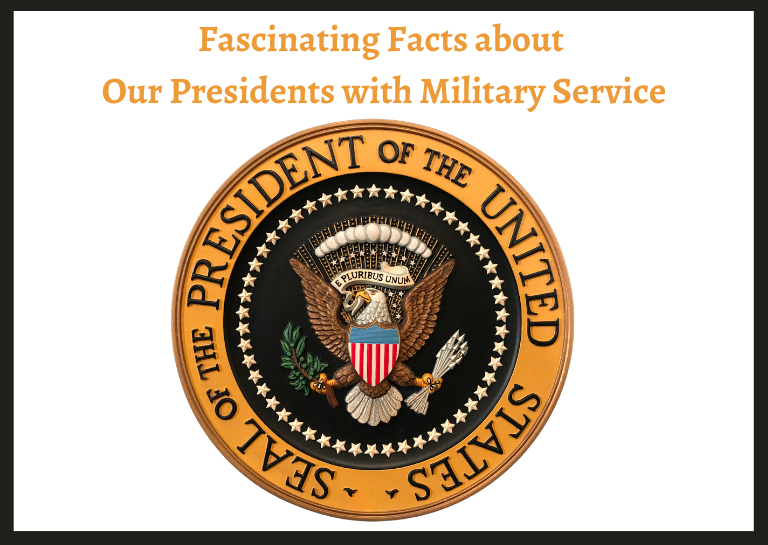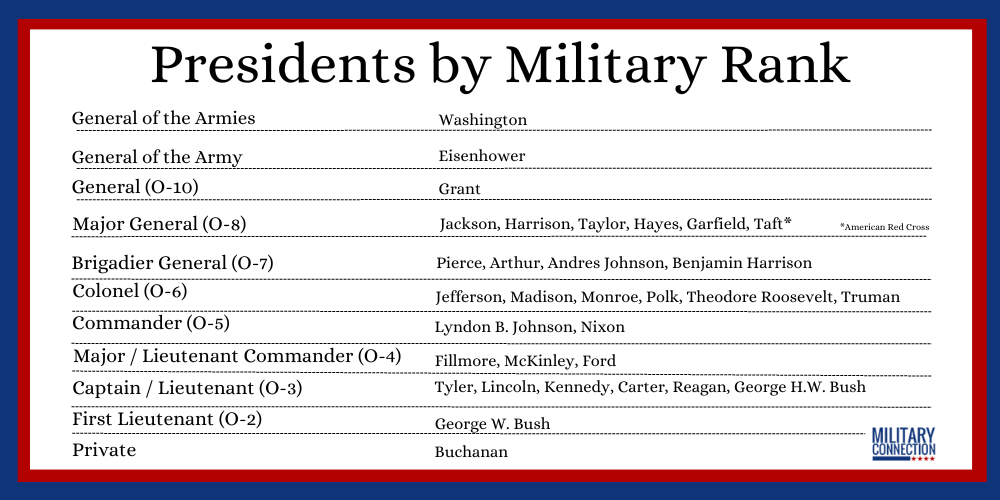
contributed by Sylvia Trein
Did you know that almost two thirds of our 46 US Presidents once served in the armed forces? While not a requirement, military experience has historically been a common credential among Presidents, and those without military service were the exception rather than the rule until the last century. Thus, the Commander in Chief has most often served in the armed forces—and usually achieved officer rank—before taking presidential office.
Still more Presidents have taken office with some type of past military experience, even while not serving in the armed forces. For example, Howard Taft was an officer commissioned by the American Red Cross and was the Secretary of War from 1904-1908, and did you know that as a young mining engineer living in China, Herbert Hoover helped guide Marines across unfamiliar terrain in the Boxer Rebellion?
Presidential military service has a fascinating history, especially from our vantage point looking back, where we can make connections and uncover interesting details about our Presidents who served in the military. Here are some facts you may not know about our Presidents who were veterans of the armed forces.
Prior to the 20th century, the vast majority of Presidents served in the armed forces, with the exception of (chronologically) John Adams, Jefferson, John Quincy Adams, Van Buren, Fillmore, and Cleveland. In the 20th century to present time, the Presidents without military service have been a streak of five from 1909 to 1945—Taft, Harding, Coolidge, Hoover, and Franklin D. Roosevelt—followed by Wilson, Clinton, and another streak of three: Obama, Trump, and Biden.
As of this time, the last US President to serve in the military was George W. Bush, who served with the Texas Air National Guard. Interestingly, his father, George H. W. Bush, is our last President to have served in combat, in World War II.
By some counts, such as holding civilian military leadership, up to thirty-one Presidents can be said to have had some kind of military experience.
Bonus facts: John Adams, Van Buren, Taft, Hoover, and Franklin D. Roosevelt all held civilian offices with some form of military leadership. Cleveland was drafted into military service but paid someone else $150 to take his place (which was legal under the Conscription Act of 1836). Clinton withdrew from starting the Reserve Officer Training Corps at the University of Arkansas to enter the Vietnam War draft; he was never drafted.
Among our Presidents with military service experience, sixteen have served with the Army, spanning Washington to Reagan. Ten served with a state militia, which later became our state defense forces (under command of the Governor); our last state militia President was Arthur.
Our first Navy veteran President was Kennedy, and our sixth and last US President to serve in the Navy was George H. W. Bush. Two Presidents have been veterans of the National Guard: Truman and George W. Bush.
Bonus fact: Thus far, we have never had a President who served with the Marine Corps, Coast Guard, or Space Force.
Presidents who served in World War II include Eisenhower, Kennedy, Lyndon B. Johnson, Nixon, Ford, Carter, Reagan, and George H. W. Bush. With one fewer, seven veteran Presidents served in the Civil War: Andrew Johnson, Grant, Hayes, Garfield, Arthur, Harrison, and McKinley. This gives us a combined fifteen Presidents from two wars—almost half of our veteran Presidents!
Bonus facts: All Civil War veteran Presidents fought on the Union side, five of the seven were from Ohio, and all were Republicans except for Andrew Johnson.
Jackson served in the Revolutionary War and the War of 1812. Grant served in the Mexican War, then the Civil War. Eisenhower was a veteran of both World Wars.
Zachary Taylor is the only President to have served in three wars: the War of 1812, the Black Hawk War (along with Lincoln), and the Mexican War.
Bonus fact: Despite his decades-long military career, Taylor had the third shortest presidency at 16 months, falling prey to a fatal stomach illness.
Grant was the first President to have attended West Point, graduating in 1843. His fellow Presidential alum, Eisenhower, graduated from their alma mater 72 years later, although West Point was not his first choice; he was denied admission to the Naval Academy because he was over application age at 20.
The third Presidential graduate of a military academy was Carter, who attended the Naval Academy during the latter years of World War II.
Bonus fact: Truman was denied admission to West Point because of his poor eyesight.
Presidential Generals have included six-star General Washington, five-star General Eisenhower, and four-star General Grant. Buchanan is our only President who served in the military, but did not rise to the rank of officer, as an E-1 Private who defended Baltimore in the War of 1812 with the Pennsylvania National Guard.

Bonus fact: Washington was awarded his rank—General of the Armies—posthumously, with the intent that no future Presidents who were in the military should outrank him.
Beyond unique ranks and number of wars served, a few more Presidents hold an exclusive distinction.
Truman is the only US President who served in World War I, and Carter is the only President to serve in the Korean War.
Kennedy is the only President awarded a Purple Heart and a Navy and Marine Corps Medal, both for his service during World War II. Theodore Roosevelt is the only President to have received a Congressional Medal of Honor—a posthumous honor shared with his son—for his service in the Spanish-American War.
Jackson is the only US President who was once a prisoner of war (captured by the British in the Revolutionary War). He was 13 years old at the time.
Bonus fact: Though he was never a veteran of the armed forces, a young John Quincy Adams was part of several naval conflicts while traveling with his father on a ship bound for France. Of his resilience under life-threatening chaos, his presidential father is quoted as remarking, “The child’s behavior gave me a satisfaction I cannot express.”
© 2006-2020 Military Connection, Owned by BL, LLC. All rights reserved

 Everything You Need to Know about Planning Military Funeral Honors
Scroll to top
Everything You Need to Know about Planning Military Funeral Honors
Scroll to top
We Can Do It! The Impact of Rosie the Riveter on American Women
Seven Must-See Historical Sites with Ties to the Revolutionary War
National Pearl Harbor Remembrance Day 2021